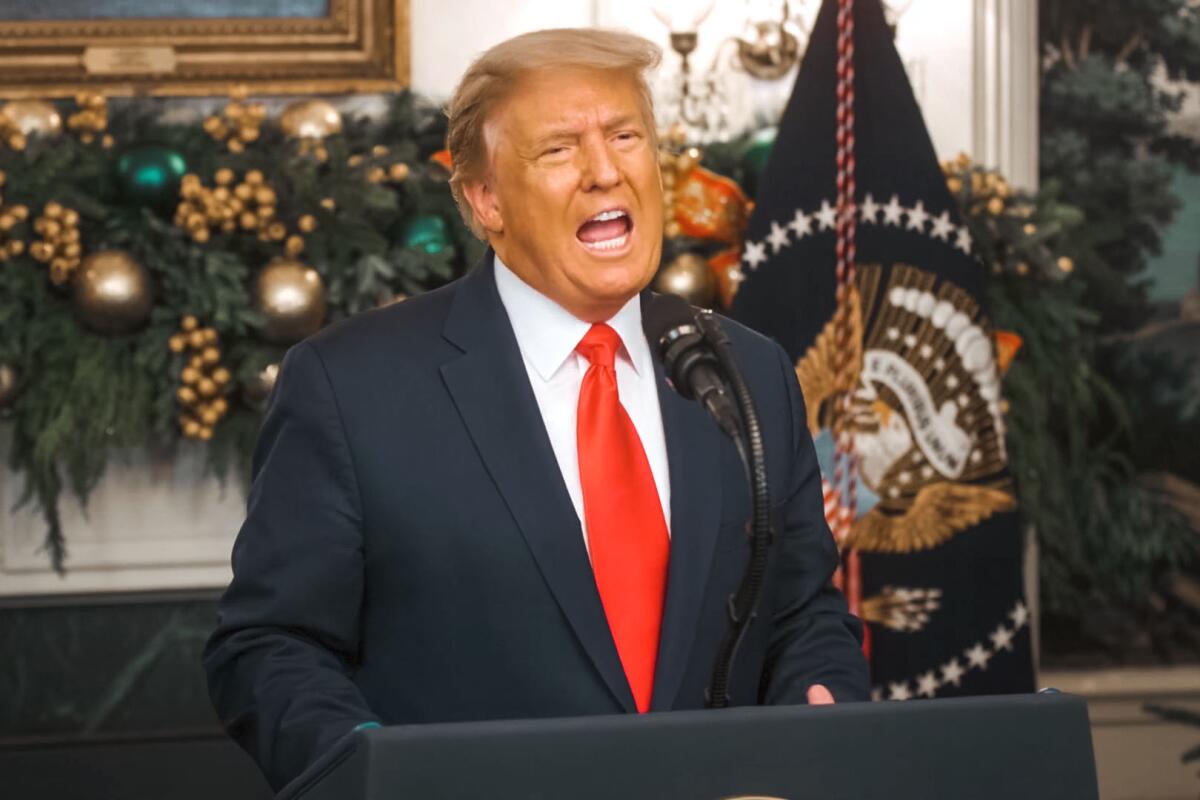Opinion: Trump’s veto of the defense bill poses a loyalty test for the GOP

- Share via
Presidents try not to pick fights they can’t win. So why did President Trump veto a defense bill Wednesday that was backed by well more than two-thirds of each chamber of Congress?
It may be Trump’s idea of a loyalty test, although this is a mighty strange time to conduct it. Barring a coup or its procedural equivalent, Trump will be leaving the White House in four weeks, having lost his bid for reelection.
More likely, it’s a fit of pique that the president’s throwing because lawmakers flatly ignored him on a handful of unrelated issues he’d made priorities. It’s more a personal beef than a principled objection.
An overwhelming majority of lawmakers supported this year’s National Defense Authorization Act — including more than three-quarters of the Republicans who voted in each chamber — because, in their judgment, Trump’s complaints about the bill didn’t outweigh the benefits it will deliver. The defense industry has smartly spread its tentacles into practically every congressional district in the United States, so bills like the NDAA have something in them for virtually every member.
In his veto message, the president cited four main objections to the measure, all of which he’d raised previously in a failed effort to block its passage. Only one of them is clearly a national security issue: the provisions requiring him to submit reports to Congress before withdrawing troops from Afghanistan, Germany or South Korea.
To Trump, such meddling in the president’s authority to defend the country is unconstitutional. In this case, though, that seems like a stretch, given that these sorts of mandates are common in authorization bills. And Trump could have simply taken a page from President George W. Bush and issued a signing statement, rather than a veto message, saying he considered those provisions to be advisory only. And then ignoring them for the rest of his term.
The other major items Trump cited were the failure to include language repealing a portion of federal communications law (commonly known as Section 230) that shields online companies from liability for the material posted by their users; a provision limiting the president’s ability to dip into military construction funds to pay for projects under the rubric of a national emergency, as Trump did in 2019 to grab more funds for his border wall than Congress had agreed to provide; and a mandate to remove from military installations all “names, symbols, displays, monuments, and paraphernalia that honor or commemorate the Confederate States of America” within three years.
It almost goes without saying that none of these causes are noble. Trump’s effort to preserve the Jim Crow-era act of naming bases after literal traitors in supposed deference to the service members who’ve been trained and stationed there over the years is particularly galling.
Trump may be calculating that the widespread and bipartisan dislike of Big Tech could help him convert enough votes in the House (about 45, based on the House’s last recorded vote on the bill) and the Senate (close to 20) to sustain the veto and force action on Section 230, a cause he has become obsessed with. Regardless of the problems lawmakers have with those companies, however, eliminating Section 230 wouldn’t end the dominance of such deep-pocketed behemoths as Facebook and Twitter. If anything, advocates for tech startups say, it would cement Big Tech’s grip on the market.
And besides, it’s not a national security issue by any stretch of the imagination.
Not surprisingly, Trump’s message drew blowback from some Democrats and approval from some Republicans on Capitol Hill. Senate Judiciary Committee Chairman Lindsey Graham (R-S.C.), who often goes to embarrassing lengths in pursuit of Trump’s approval, tweeted that he would not vote to override unless “effort is made to wind down Section 230,” whatever that means.
Shifting Graham, who missed the Senate’s last vote on the NDAA, from the “absent” column to the “no” column will help Trump a little, but he’ll need many more lawmakers to switch sides in order to sustain the veto. And lawmakers will be hard pressed to support Trump now after rejecting the very same complaints two weeks ago.
The NDAA veto may be a dry run for Trump, who on Tuesday blasted the $2.4-trillion package Congress passed to fund the federal government through Sept. 30 and provide more relief from the COVID-19 pandemic. The president didn’t explicitly threaten a veto, but he did call on Congress to amend the bill — something that it cannot do, constitutionally — to more than triple the direct relief payments to American households.
Just how tight does Trump’s grip on Republicans in Congress remain as his term comes to an end? We’ll see as soon as the House votes to override the NDAA veto, which is due to happen on the 28th.
More to Read
A cure for the common opinion
Get thought-provoking perspectives with our weekly newsletter.
You may occasionally receive promotional content from the Los Angeles Times.











